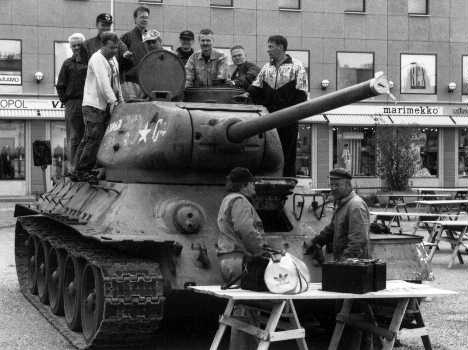 The tank being prepared for
transport and, eventually, rebuilding. On top of their new charge, members of the Northern
Carelia Weapons History Guild.
The tank being prepared for
transport and, eventually, rebuilding. On top of their new charge, members of the Northern
Carelia Weapons History Guild.
The Scaup Tank...
Continued: Part 2/2
Text and photography: J. Hartikka
English edition by Eero Juhola (See home pages: Finnish Weapons)
Wearing hearing protectors I crawl onto the driver's seat from the fighting
compartment and lift up the back rest. The gear selector, operated with the right hand, is
located far enough so that I have to lean forwards, towards it when shifting. There is a
reverse gear and five gears forward, the two first of which are for low-speed,
cross-country use. "The gears are a bit confusing", the more experienced driver
explains, "I don't always remember how they go either". At the end of the
selector is a lever not unlike that used to operate a motorcycle's clutch. This contols a
wire locking the gears on so that they do not disengage on their own.
If Starting Up Is A Liturgy, Then Driving Is an Orgy !
.Because to clutch, steering sticks, brakes and all other steering equipment are manually
operated, one would expect driving the T-34 to be a body-building enthusiast's dream
workout. But as I step on the clutch pedal it sinks in surprisingly easily and I remember
driving family cars with stiffer clutch pedals. Pressed down as far as it will go, the
pedal vibrates under the sole of my boot and the low whine of the pressure bearing can be
heard from the rear of the vehicle. I reach out for the gear selector and switch into
third gear which is suitable for getting the tank moving on level ground. The gearbox lets
out an unsynchronized growl "CRRunn-Ch-Klack" affirming my gear selection. As I
give it a little gas the engine roars, gaining revolutions. I raise my foot off the
clutch. The engine stalls!
Come to think of it, it is only logical. While the tank's five hundred horsepower may seem
impressive at first, they have to move the vehicle's thirty tons mass. In fact we only
have one tenth of the horsepower per kilogram of weight available to a modern motor car.
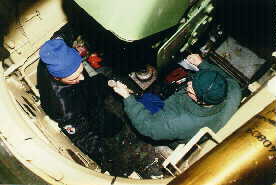 A look down from the
turret: people from a local radio station are interviewing the tankers.
A look down from the
turret: people from a local radio station are interviewing the tankers.
Because the engine is warm and lubricated I again step on the clutch and press
on the start button without first using the oil pump. The engine starts immediately. I
give it a lot of gas and further increase revolutions as I lift the clutch. The Scaup
surges forward, the tracks rattling softly!
Driving at speed I try pulling the right hand side steering stick. The clutch is released
and the Scaup seems at first to be considering turning to the right but then decides
against it. I pull further, wondering whether the strength of one arm is sufficient to
turn such a lump of steel as this tank. The stick is now far back, the brake engages and
the Scaup turns softly towards the right. I pull a bit more still and the tank turns
tighter, the tracks churning the icy ground. I release the stick and the tank immediately
straightens out from the turn, continuing directly ahead. I test the steering sticks some
more. Their travel is long but using them is rather light work. There is no need to use
two hands - the T-34 turns nicely with just two fingers !
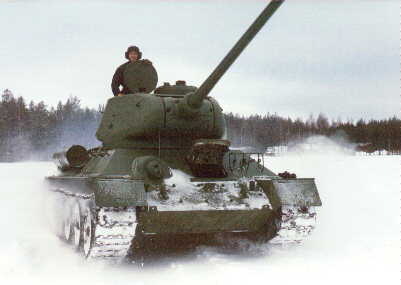 We continue the test drive on a snow-covered field.
The ride is loud but does not shake your teeth loose, as one would expect. The huge weight
on spring-suspended tracks dampens the bumps and the resulting ride is actually rather
smooth. Going over a ditch the Scaup sways gently, letting out a derogatory puff of blue
smoke from the exhausts, and continues onward - with the large-caliber gun proudly pointed
up and forwards - trailing a cloud of snow flakes behind it.
We continue the test drive on a snow-covered field.
The ride is loud but does not shake your teeth loose, as one would expect. The huge weight
on spring-suspended tracks dampens the bumps and the resulting ride is actually rather
smooth. Going over a ditch the Scaup sways gently, letting out a derogatory puff of blue
smoke from the exhausts, and continues onward - with the large-caliber gun proudly pointed
up and forwards - trailing a cloud of snow flakes behind it.
When you step on the gas pedal the engine gobbles copious amounts of fuel - it burns
through 250 liters of domestic heating fuel or diesel per hour. Driving to the local gas
station and telling them to "fill 'er up" will cost you the equivalent of 360 US
Dollars in this country. For the investment you do get a wide rut in the snow bank as you
drive. The tracks have no problem reaching the dirt of the field and the Scaup sails
onward, shiplike, softly swaying as it plows through the sea of snow. When the sharp nose
of the tank plunges into a particularly high snow bank a bucketful or two of snow falls
onto my lap through the open driver's hatch.
I drive on, towards a high mound of dirt. I remember to warn our almost blind passengers
in the fighting compartment to hang on to something. The terrain in front is not really
visible to anyone except the driver and, if he looks out from the turret hatch, the
commander. Our tank climbs up the mound like a tug boat would climb atop a large wave. All
I can see out my hatch is the cloudy sky. We did not drive up to the very highest point of
the mound. "Hey, no problem," the Scaup seems to be saying, slowly listing to
the left and then sliding sideways for a bit. Then she brings her nose down and begins the
sharp descent downwards.
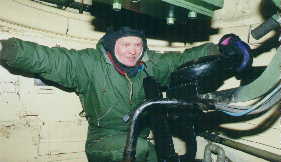 Veikko Kosonen hangs onto
the gunner's seat in order to stay upright. He is wearing the "sausage hat", the
tankers' helmet, and stands right below the turret, where the rear seat would be located
if the Scaup were a motor car. Behind him is the loud engine, above hangs the cannon and
in front are the turret's electrical wires.
Veikko Kosonen hangs onto
the gunner's seat in order to stay upright. He is wearing the "sausage hat", the
tankers' helmet, and stands right below the turret, where the rear seat would be located
if the Scaup were a motor car. Behind him is the loud engine, above hangs the cannon and
in front are the turret's electrical wires.
The horizon re-appears momentarily only to disappear somewhere upwards. What I
see now is just the white snow. I brake with the engine. As it plunges into the snowbank
the tank straightens out and the horizon complete with treeline confirms that we are
headed in the right direction. I glance backwards and see the proud smile of our guide and
the slightly nervous ones of our first-timer passengers. The Scaup has a way of getting to
you - once again she has enlarged her fan club.
License to Bear Cannon
Riding in the turret of a tank is quite an experiance in itself. The gunner has his own
collapsible, stool-sized set on the left side of the gun. All around the interior of the
tank are switches and levers amidst which the four-man crew must find their own places.
But there is one instrument which dominates the interior, the system around which the tank
was built: the cannon.
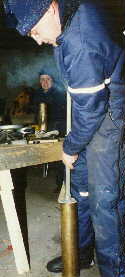 Olli Suokas pushes in the blank round's covering. Kari Haantio watches
from behind the table. About can's worth of powder mixture is used for every movie special
effect round.
Olli Suokas pushes in the blank round's covering. Kari Haantio watches
from behind the table. About can's worth of powder mixture is used for every movie special
effect round.
The long-barrelled 85mm gun is about a centimeter larger than the more common Scaup gun
used on the Finnish front during the war. It automatically opens the lock and ejects the
spent shell casing but of course requires someone to put in a new one. In its present use
the gun does not work semiautomatically because the blank shots do not generate enough
recoil.
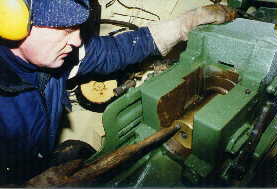 The breech is opened by pulling the
lever on its side of the cannon, on the right. A new round is then inserted into the gun.
The breech is opened by pulling the
lever on its side of the cannon, on the right. A new round is then inserted into the gun.
.The tank has been granted an official "license to bear cannon" by
the county administrative board. Despite this no one within gun range of Joensuu need
worry about the gunner missing his mark - the gun can only be used to shoot blanks. For
his purpose it has already been used on special occasions, for instance to mark General
Ernrooth's birthday. The number of shots that can be fired is constrained by a shortage of
suitable shell casings and the high price of powder - about 35 US Dollars worth of powder
goes into every pyrotechnic round.
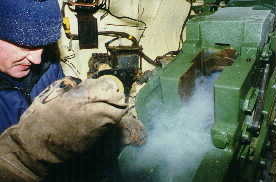 "Smoking
it !" After the shot the spent shell casing falls out when the breech is opened.
However the crew gets to inhale all the smoke that follows the cartridge.
"Smoking
it !" After the shot the spent shell casing falls out when the breech is opened.
However the crew gets to inhale all the smoke that follows the cartridge.
But you do get your money's worth of bang per buck. The armor protects the occupants'
hearing from most of the blast but still the gunner and commander have a tough time in the
turret. When the breech is opened all the smoke left in the barrel is sucked into the
turret, making the crew cough.
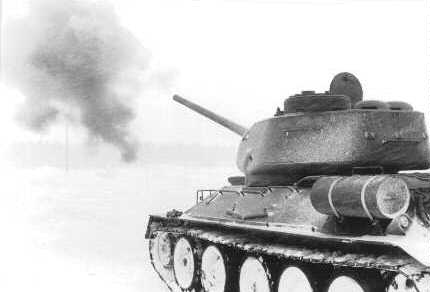 General Ernrooth's birthday salute was delivered
in a snow storm.
General Ernrooth's birthday salute was delivered
in a snow storm.
Slave Labor
- The engine leaks oil.
- The batteries are not being recharged.
- The electric pump does not raise pressure.
- A track greaser has become loose.
- Engine coolant seems to be leaking too.
- A track pin is broken.
- The oil cup has been broken in two.
The tank must be checked after each and every drive. Sometimes it seems as if every single
part which can break has been broken. This green giant quickly teaches you the value of
hard work for without long hours in the garage it will soon stop moving. The team
sometimes labors without break through their spare time. A veritable ant army of mechanics
can be seen crawling about on this mountain of steel, working inside it and crawling under
it.
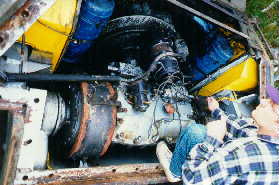 The Scaup's hood is open
for repairs. In the middle is the gearbox surrounded by track brakes and clutches. Yellow
color marks the fuel tank and the blue thing is the engine air intake. The starter motor
is the surprisingly small black box on top of the gearbox. The large, round black piece of
machinery is the flywheel.
The Scaup's hood is open
for repairs. In the middle is the gearbox surrounded by track brakes and clutches. Yellow
color marks the fuel tank and the blue thing is the engine air intake. The starter motor
is the surprisingly small black box on top of the gearbox. The large, round black piece of
machinery is the flywheel.
It is not always clear how to go about fixing some part of the vehicle. Then
the team gathers to think and discuss, and usually ends up simply trying something.
Slowly, almost unnoticeably, one small lug at a time the tank sheds her unkempt
appearance. Now retired from active duty, she will begin her life anew. Extra fuel tanks
are bolted onto her sides, a new coat of paint is applied, shiny new headlights appear on
her nose and many more bits and pieces are added - enough to make any tank proud !
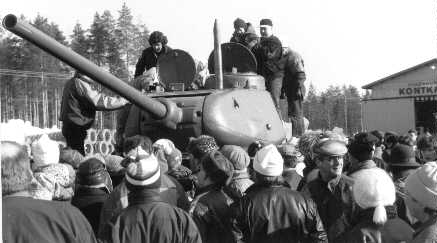 "For once we get to
touch a real tank !" The Scaup at a fair. The people are queuing for their turn slide
down the hatch into the turret. A replica of the shell is atop the turret.
"For once we get to
touch a real tank !" The Scaup at a fair. The people are queuing for their turn slide
down the hatch into the turret. A replica of the shell is atop the turret.
Rattling by she seems to be telling you her story... and watching her slow swaying your
imagination is let loose: "Yes, I've taken part in all sorts of endeavors", she
seems to be saying. "Mind you my heart wasn't always in it. But I always did my part
the best I could". And we can figure out the ending of this Scaup's story by
ourselves.
* * * The End * * *
Advertisement:
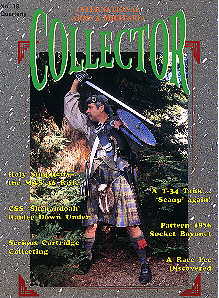
The T-34 story above was previously published on the International Arms &
Militaria Collector magazine, No. 19.
Collector magazine (cover beside) and a variety of collector's books are
published by Ian Skennerton. The publisher has offices in Australia, America and Bangkok.
Contact information:
Arms & Militaria Press
P.O. Box 5659
Grants Pass OR 97527, USA
E-mail: idskennerton@hotmail.com
Or:
Ian Skennerton Publishing
P.O. Box 80
Labrador 4215, Australia
Phone: 07 5594 7911 Fax: 07 5594 7951
<< Part 1/2 Gunwriters Links
Gunwriters on the Web T-34 Tank,
part 2: http://guns.connect.fi/gow/T34tank2.html